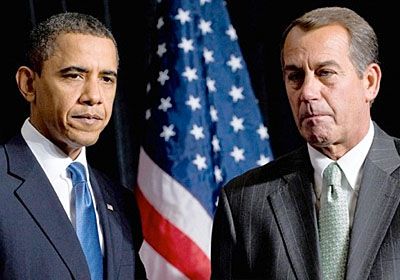Blame for Debt Talks is Divided
There is little evidence to suggest that either President Obama or House Speaker John Boehner gained much political leverage as a result of Friday night’s dueling press conferences or Monday night’s back-to-back speeches. If anecdotal evidence and public opinion polls are to be believed, the only sure thing that has happened as a result of the televised bickering is that the level of public frustration, which was already high, has reached levels not seen in a very long time. Personally, I have not been this worried about the fate of our Republic since the darkest days of the Watergate crisis.
Now, I have no illusions that what is written here has much impact on the larger political conversations that go on in the country, or on the debates on Capitol Hill, or on the strategy discussions that are occur in the West Wing. But in the faint hope that a little straight talk, like chicken soup, cannot hurt, I offer the following observations.
Last November, when he failed to embrace the Bowles/Simpson report and recommendations, Barack Obama missed the opportunity to gain both the political and substantive high ground on the deficit and debt limit issues. Monday night, by giving just one more speech filled with generalizations and some amount of “b.s.” (for example, that anything close to the level of savings needed in entitlements can be obtained simply by eliminating “waste and fraud”), he may well have missed an opportunity to save his presidency. As one who supported his 2008 candidacy wholeheartedly, who welcomed his inauguration with an enthusiasm I have rarely felt, and who continues to hope for his success, it pains me to say that.
But whatever the president’s failings might be, they pale in comparison to the way the bulk of Congressional Republicans have behaved and performed. Although I think Speaker Boehner would like to strike a deal, his effectiveness has been severely crippled by the rigid positions taken by the Tea Party and its adherents. I am completely disgusted with those who are driving the country to default, impaired as they are by the effects of a lethal mix of ignorance and hatred for the President.
And at least as bad as all of that is the political thuggery employed by Grover Norquist and his misnamed “Americans for Tax Reform”. Raising--or lowering--policy positions to the status of non-debatable theology, whereby compromise is heresy, represents a formula for disaster in a pluralistic, representative democracy such as ours.
Finally, even though I know from experience the downside risk for politicians in sharing blame with the voters (I was involved in some of the early drafts of Jimmy Carter’s so-called “malaise” speech in 1979), I also know that the people are not without some considerable measure of responsibility for the current mess in Washington, D.C. Citizens regularly want and demand more government services than they are willing to pay for. Compounding that problem is the fact that the voters helped trigger the current stalemate, not just by installing a divided government in 2010, but by making one half of legislative branch so extreme that working across the partisan divide in any meaningful way is absolutely impossible. To a degree, and like it or not, the voters are now getting a lot of what they deserve.


